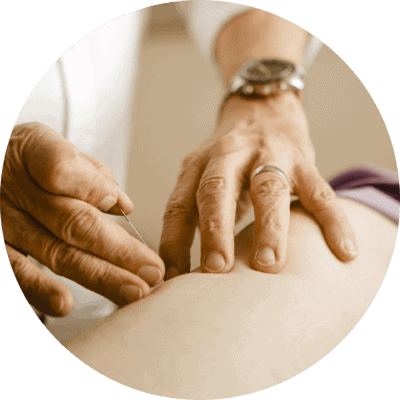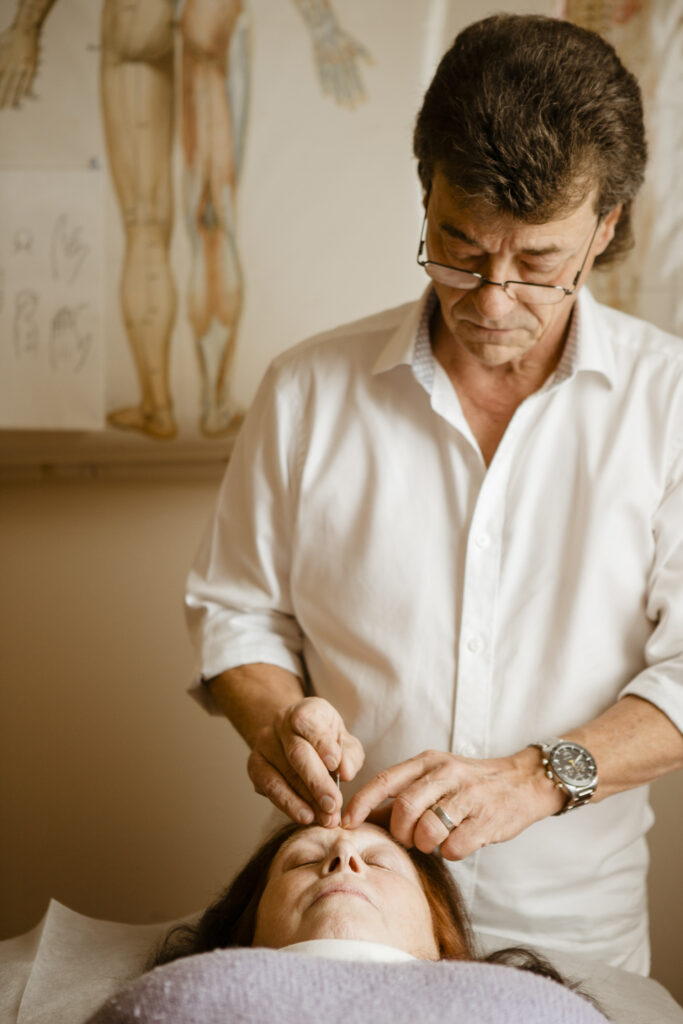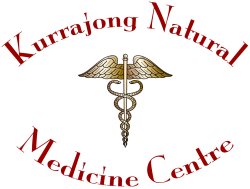Acupuncture at Kurrajong Natural Medicine Centre

What is Acupuncture
- Acupuncture involves the use of very thin, solid, pre-sterilised, single use, stainless steel needles, which are inserted into the body at very specific locations, known as Acupuncture Points.
Benefits of Acupuncture
- According to the Australian Natural Therapists Association, acupuncture can assist in treating a wide range of physical, neurological, mental and emotional ailments.
Choosing an Acupuncturist
- According to the Departement of Health & Human Services, Victoria, Australia, when choosing an Acupuncturist, you should only choose a qualified, registered Acupuncturist.
What Is Acupuncture?
Acupuncture has been part of traditional Chinese medicine (TCM) for thousands of years making it one of the oldest systems of medicine in the world.
It involves the use of very thin, solid, presterilised, single use, stainless steel needles, which are inserted into the body at very specific locations, known as Acupuncture Points, or Acupoints.
A major concept of TCM, and thus Acupuncture, is the idea that bio-electricity (the body’s own electrical energy), referred to in Chinese medicine as ‘Qi’, circulates throughout the body via a system of pathways known as acupuncture channels. These channels are in many cases associated with the potential spaces between the body’s tissues, such as fascia, muscles tissues, and organs.
In TCM philosophy, disease is believed to be caused by an imbalance or disharmony in the normal flow of Qi (the body’s bio-electricity) through these channels. Acupuncturists will choose appropriate points in an attempt to rebalance and reestablish the normal flow of Qi.
This video is a shortened version of my presentation to other healthcare professionals and lay people who have shown an interest in Acupuncture and Chinese medicine.
I’ve tried to keep it simple and easy to understand without getting into medical speak. I hope you’ll enjoy this and will get some insight from the video on how acupuncture works and how it may be able to help you.
Acceptance of Acupuncture in Australia
According to the Australian Traditional Medicine Society (ATMS), Acupuncture is one of the most accepted complementary therapies in Australia and is fast gaining acceptance in mainstream medicine with many GPs referring patients to an accredited Acupuncturist and TCM practitioners. By law, in Australia, Acupuncturists and Chinese herbal medicine practitioners need to be registered with the Chinese Medicine Board under the auspice of AHPRA (Australian Health Practitioner Regulation Agency).
What You Should look for When Choosing an Acupuncturist
According to the Department of Health & Human Services, Victoria, Australia, when choosing an Acupuncturist, you should only choose a qualified, registered practitioner.
Some healthcare professionals (other than Acupuncturists) offer acupuncture following completion of a short course. However, the philosophy and training of registered Acupuncturist is complex and extends over several years.
In the hands of an unskilled practitioner, acupuncture may lead to a number of problems including:
- Allergic reactions – herbs are sometimes burnt over the skin to create specific points of heat near acupuncture points. Herbs are as powerful as pharmaceutical medications and need to be treated with the same respect and caution
- Infection – if the needle is unsterile, bacteria can cause local infection. There is also a risk of contracting hepatitis, HIV or any other bloodborne disease if the needles are reused
- Injury to the skin – clumsy insertion, or entry of a needle into a blood vessel, can cause bleeding, bruising and pain.
- Unexpected side effects – such as an increase in pain, depression, convulsions or insomnia. Acupuncture can produce significant changes within the nervous system and it is vital that the correct points are stimulated in the right way.
The message from the Department is clear – you should NOT allow a healthcare practitioner who is not a qualified and registered Acupuncturist to do Dry Needling.

What Are The Benefits of Acupuncture?
In it’s “Definitive Guide to Acupuncture”, the Australian Natural Therapists Association states, that according to an evidence-based review of clinical literature, acupuncture can assist in treating a wide number of physical, neurological, mental and emotional ailments. The ailments that have been backed up by both clinical experience and research include:
- Chronic pain – The efficacy of acupuncture for chronic pain is well-proven. It has been shown to have a clinically relevant effect on chronic pain that persists over time, including chronic lower back pain, neck pain, shoulder pain and knee osteoarthritis pain.
- Acute pain – Research shows that acupuncture can provide an immediate analgesic effect for acute pain conditions, such as tendinitis, frozen shoulder (adhesive capsulitis), tennis elbow (lateral epicondylitis), sciatica, acute lower back pain, and postoperative pain.
- Allergic rhinitis, acute sinusitis and the common cold – Acupuncture is a safe and effective treatment for patients with allergic rhinitis, acute sinusitis and common cold, reducing nasal and eye symptoms such as itching, sneezing and blocked or runny nose.
- Dental pain – Acupuncture can help with alleviating dental pain, including toothaches, post-extraction pain, temperomandibular joint (TMJ) pain, TMJ clicking and locking, chronic muscle pain or spasms, or nerve pain.
- Tension headaches – Acupuncture has been proven to help alleviate tension headaches, including chronic tension-type and chronic episodic headaches and migraine prophylaxis.
- Anxiety and depression – Numerous studies show that acupuncture can decrease anxiety and enhance the effectiveness of certain antidepressants, helping selective serotonin reuptake inhibitor (SSRIs) treatment work faster to increase serotonin levels. Acupuncture can also reduce the side effects of antidepressants.
- Menstrual irregularities (dysmenorrhea) – Some studies show that acupuncture may be useful in treating menstrual pain and irregularities.
- Infertility – Acupuncture is proven to help support successful conception in women undertaking in vitro fertilisation (IVF), ease stress, anxiety and depression in infertile couples, and reduce depression symptoms in women struggling with infertility.
- Pregnancy & Labour – Acupuncture can help ease morning sickness in pregnant women, as alleviate back or pelvic pain during pregnancy. The use of acupressure, when combined with prenatal interventions, were shown to significantly assist better labour outcomes for women.
- Nausea and vomiting – Acupuncture can lessen nausea and vomiting after chemotherapy treatments and post-operation.
- Weight loss – While there is no magic acupuncture point or treatment to help weight loss, acupuncture can help support the journey toward weight loss through relief from stress or depression, by curbing appetite, improving digestion and boosting metabolism.
- Insomnia – Many studies have demonstrated acupuncture to be an effective treatment for insomnia. Acupuncture can help stimulate melatonin production, induce sleep onset, and reduce sleep disruption and arousal during the night.
- Stroke rehabilitation – A number of recent studies have demonstrated that positive clinical outcomes for the treatment of stroke (rehabilitation) were consistent across multiple scalp acupuncture studies and that acupuncture increases brain activity in stroke victims. Using MRI technology, researchers have documented that acupuncture increased brain activity and functionality and that sham acupuncture and a blank control group did not.
References
- Chan, Y.Y., Lo, W.Y., Yang, S.N., Chen, Y.H., & Lin, J. G. (2015). The benefit of combined acupuncture and antidepressant medication for depression: A systematic review and meta-analysis. Journal of Affective Disorders, 1(176):106-17. doi: 10.1016/j.jad.2015.01.048 [Link to Journal article: https://www.sciencedirect.com/science/article/pii/S016503271500052X?casa_token=GwB92wm1QgQAAAAA:SJnaFdYUBMeioeRul62L4fY9I-pCyrDaimpRdAofUga0beXsOnVTBdCYFe3DQ8C9RsNybvvJ]
- Chen, L. & Sun, Z. (2014). Research on Treating Stroke by Head Acupuncture Therapy. Clinical Journal of Chinese Medicine 6(1).
- Chinese Medicine Traveller. Acupuncture Anti-Inflammatory Crohn’s Disease.
- Curran, J. (2008). The Yellow Emperor’s Classic of Internal Medicine. BMJ, 336(7647): 777.
- Hua, A. (2010). Treatment of 85 Cases with Chronic Rhinitis by Acupuncture. Journal of Acupuncture and Tuina Science, 8(5): 318.
- Huijuan, C., Xingfang, P, Hua, L. & Jianping, L. (2009). Acupuncture for Treatment of Insomnia: A Systematic Review of Randomized Controlled Trials. Journal of Alternative and Complementary Medicine, 15(11): 1171–1186.
- Levett, K.M., Smith, C.A., Bensoussan, A., & Dahlen, H.G. (Complementary therapies for labour and birth study: a randomised controlled trial of antenatal integrative medicine for pain management in labour. BMJ Open, 6(11).
- Lim, H.D., Kim, M.H., Lee, C.Y. & Namgung, U. (2016). Anti-Inflammatory Effects of Acupuncture Stimulation via the Vagus Nerve. PloS one, 11, 3:4-5. ncbi.nlm.nih.gov/pubmed/26991319
- Linde, K., Allais, G., Brinkhaus, B., Fei, Y., Mehring, M., Shin, B., Vickers, A., & White, A.R. (2016). Acupuncture for tension-type headache. Cochrane Database System Review, 21(1). doi: 10.1002/14651858.CD007587 [Link to Journal article: https://www.ncbi.nlm.nih.gov/pmc/articles/PMC4955729/]
- Liu, H., Shen, X., Tang, H., Li, J. Ting, X., & Yu, W. (2013). Using MicroPET Imaging in Quantitative Verification of the Acupuncture Effect in Ischemia Stroke Treatment. Scientific Reports, 3(1070).
- Lu, D.P. & Lu, G.P. (2013). A Historical Review and Perspective on the Impact of Acupuncture on U.S. Medicine and Society. Medical Acupuncture, 25(5): 311–316.
- Lu, G. & Needham J. (25 October 2002). Celestial Lancets: A History and Rationale of Acupuncture and Moxa. ISBN 978-0700714582.
- Lu, L., Zheng, H., Zheng, Q., Hao, X., Zhou, S., Zhang, S. Wei, T., Gao, T., Duoxi, D., Zhao, L., Ning, L., & Ying, L. (2017). The long-term effect of acupuncture for patients with chronic tension-type headache: study protocol for a randomized controlled trial. Trials, 18(453).
- MacPherson, H., Vertosick, E. A., Foster, N. E., Lewith, G., Linde, K., Sherman, K. J., et al. (2016). Pain, 1–22. https://doi.org/10.1097/j.pain.0000000000000747 [Link to Journal article: https://journals.lww.com/pain/Abstract/2017/05000/The_persistence_of_the_effects_of_acupuncture.5.aspx]
- McDonald, J. & Janz, S. (2017). The Acupuncture Evidence Project: A Comparative Literature Review. Australian Acupuncture and Chinese Medicine Association Ltd.
- McDonald, J.L., Smith, P. K., Smith, C.A., Xue, C.C., Golianu, B. & Cripps, A.W. (2016). Effect of acupuncture on house dust mite specific IgE, substance P, and symptoms in persistent allergic rhinitis. Annals of Allergy, Asthma & Immunology, 116, 6: 497-505.
- Moffet, H.H. (2002). How might acupuncture work? BMC Complement Altern Med 6, 25. doi:10.1186/1472-6882-6-25
- Purnachandrarao, N.N., Kiran, R.A., Yalamanchal, S., Kumar, V.A., Suresh, G., & Vashist, N. (2014). Acupuncture: An Alternative Therapy in Dentistry and Its Possible Applications. Medical Acupuncture, 26(6):308–314.
- VanderPloeg, K. & Yi, X. (2009). Journal of Acupuncture and Meridian Studies, 2(1), 26-33. ISSN 2005-2901, https://doi.org/10.1016/S2005-2901(09)60012-1.
- Vickers, A.J., Vertosick, E.A., Lewith, G., MacPherson, H., Foster, N.E., Sherman, K.J., Irnich, D., Mitt, C.M. & Linde, K. (2017). Acupuncture for Chronic Pain: Update of an Individual Patient Data Meta-Analysis. The Journal of Pain, 19(5), 455-474.
- Wang, J.Y., & Robertson, J., (2008) Applied Channel Theory in Chinese Medicine Wang Ju-Yi’s: Lectures on Channel Therapeutics. Eastland Press.
- Wang, S., Zhang, J. and Qie, L. (2014). Acupuncture Relieves the Excessive Excitation of Hypothalamic-Pituitary-Adrenal Cortex Axis Function and Correlates with the Regulatory Mechanism of GR, CRH, and ACTHR. Evidence-Based Complementary and Alternative Medicine. https://doi.org/10.1155/2014/495379
- Xiang, A., Cheng, K., Shen, X., Ping, X. & Sheng, L. (2017). The Immediate Analgesic Effect of Acupuncture for Pain: A Systematic Review and Meta-Analysis. Evidence Based Complementary Medicine, doi: 10.1155/2017/3837194
- Yin, C., Buchheit, T. E., & Park, J. J. (2017). Acupuncture for chronic pain: an update and critical overview. Current Opinion in Anaesthesiology, 1. https://doi.org/10.1097/ACO.0000000000000501
- Zhao, C., Bao, C., L, J., Zhu, Y., Wang, S., Yang, L., Liu, H., Dou, C., Ding, G., Wang, X., & Wu, H. (2015). Moxibustion and Acupuncture Ameliorate Crohn’s Disease by Regulating the Balance between Th17 and Treg Cells in the Intestinal Mucosa. Evidence Based Complementary Alternative Medicine, doi: 10.1155/2015/938054
Disclaimer
Disclaimer information for users of the Kurrajong Natural Medicine Centre website.
Page last updated: 14th Feb. 2021
THE INFORMATION PROVIDED IN ANY OF THE ARTICLES PUBLISHED ON THIS SITE IS FOR EDUCATION AND INFORMATION PURPOSES ONLY.
NO CLAIMS ARE MADE AS TO THE EFFECTIVENESS OF ANY OF THE TREATMENTS USING ACUPUNCTURE OR THAT THIS THERAPY IS SUITABLE FOR THE READER.
THE SOURCES OF ALL THE ARTICLES ARE LISTED AND COME FROM REPUTABLE PEER-REVIEWED SCIENTIFIC JOURNALS. WHERE POSSIBLE LINKS TO THE ORIGINAL SOURCE ARE PROVIDED FOR THE READER TO FOLLOW.
Articles published on this page are not intended to provide diagnosis, treatment or medical advice. Content provided on this page is for informational purposes only. Please consult with a physician or other healthcare professional regarding any medical or health related diagnosis or treatment options. Information on this page should not be considered as a substitute for advice from a healthcare professional. The claims made about specific products throughout this article are not approved to diagnose, treat, cure or prevent disease.
Information provided for education and research information only
The information on this website is presented by Kurrajong Natural Medicine Centre for the purpose of disseminating health information free of charge for the benefit of the public.
While Kurrajong Natural Medicine Centre has exercised due care in ensuring the accuracy of the material contained on this website, the information on the site is made available on the basis that Kurrajong Natural Medicine Centre is not providing professional advice on a particular matter.
This website is not a substitute for independent professional advice. Nothing contained in this site is intended to be used as medical advice and it is not intended to be used to diagnose, treat, cure or prevent any disease, nor should it be used for therapeutic purposes or as a substitute for your own health professional’s advice.
Kurrajong Natural Medicine Centre does not accept any liability for any injury, loss or damage incurred by use of or reliance on the information provided on this website.
Quality of information
Kurrajong Natural Medicine Centre makes every effort to ensure the quality of the information available on this website and updates the information regularly. Before relying on the information on this site, however, users should carefully evaluate its accuracy, currency, completeness and relevance for their purposes, and should obtain any appropriate professional advice relevant to their particular circumstances. Kurrajong Natural Medicine Centre cannot guarantee and assumes no legal liability or responsibility for the accuracy, currency, completeness or interpretation of the information.
The material may include the views or recommendations of third parties and does not necessarily reflect the views of Kurrajong Natural Medicine Centre or indicate a commitment to a particular course of action.
Links to other websites
This website contains links to other websites which are external to Kurrajong Natural Medicine Centre. Kurrajong Natural Medicine Centre takes reasonable care in selecting linking websites but Kurrajong Natural Medicine Centre accepts no responsibility for material contained in a website that is linked to this site. It is the responsibility of the user to make their own decisions about the accuracy, currency, reliability and correctness of information contained in linked external websites.
Links to external websites are provided for the user’s convenience and do not constitute an endorsement or a recommendation of any third party products or services offered by virtue of any information, material or content linked from or to this site. Users of links provided by this site are responsible for being aware of which organisation is hosting the site they visit.
Views or recommendations provided in linked sites may include the views or recommendations of third parties and do not necessarily reflect those of Kurrajong Natural Medicine Centre or indicate a commitment to a particular course of action.



